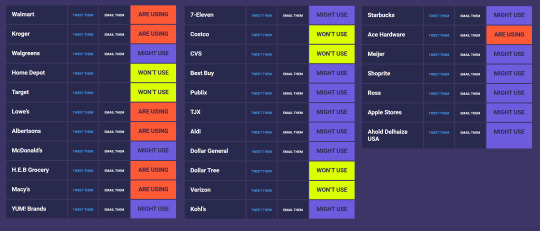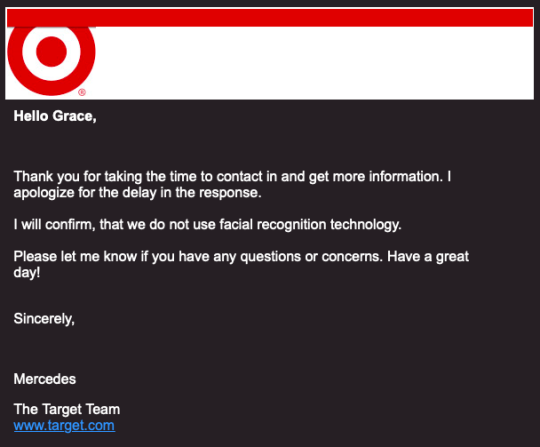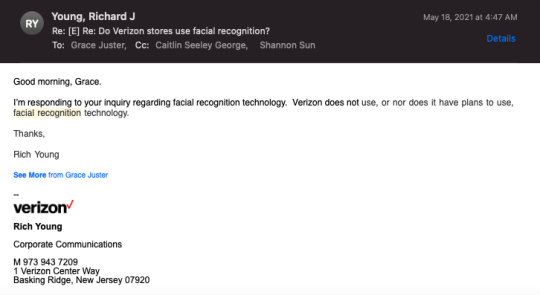New Report and Scorecard Shows Which Retailers Are Using Facial Recognition on Shoppers, Employees
FOR IMMEDIATE RELEASE: 5:30 am Tuesday, May 25
Contact: Caitlin Seeley George, caitlin@fightforthefuture.org
Shoppers planning to take advantage of Memorial Day sales should know which stores are using racist, dangerous surveillance technology.
Digital rights group Fight for the Future has launched a new website and scorecard that tracks whether or not top retailers use, don’t use, or might use facial recognition on people in their stores. Walmart, Albertsons, Kroger, Lowes, and Macy’s are among the stores flagged as using facial recognition on shoppers and workers. Walgreens, McDonald’s, 7-11, and Best Buy are among retailers that have not clarified their policies. Home Depot, Target, Costco, CVS, Dollar Tree, and Verizon confirmed to Fight for the Future that they are not using facial recognition in their stores.

Walmart says it uses the technology to reduce shoplifting. An Albertsons in Albuquerque used facial recognition on a shopper who had allegedly stolen from the store in the past. And Kroger, Lowes, and Macy’s have all faced lawsuits for using facial recognition in stores in Illinois, where the Illinois Biometric Information Privacy Act makes it illegal to do so without consent.

Screenshot of email Fight for the Future received from Target

Screenshot of email Fight for the Future received from Verizon
“People deserve to know if a store is using invasive and biased surveillance technology to discriminate against customers and employees, and with so many major retailers using or potentially using the technology no one is safe,” said Caitlin Seeley George (she/her), campaign director at Fight for the Future. “It may seem futuristic, but the reality is that stores can track every move you make, sync video with data about your income, past purchases, and other behaviors, then make decisions about how much to charge you, how to treat you, and even whether or not to allow you into the store. These practices are unfair, augment bias, and are an invasion of your privacy.”
“Up until this point, stores have tried to keep their use of surveillance technology quiet to avoid public scrutiny. We can’t let this continue under-the-radar any longer. The dangers are too great,” added Seeley George.
Over the past year, facial recognition vendors have used the pandemic in an effort to expand use of the technology, calling it a hands-free option for everything from paying for products to taking temperatures. But these sales pitches ignore how the technology causes serious harms: someone who participated in a protest could have their image flagged and be banned from a store; an algorithm could wrongfully accuse a person with a disability of being intoxicated and security could throw that person out of a store; a shopper who relies on SNAP could be flagged as low priority for customer support; a worker could be tracked all day and be disciplined for taking too many bathroom breaks; a store could voluntarily hand all of this data over to government entities like ICE.
In fact, according to Senator Ron Wyden, the Pentagon is already using surveillance data purchased from corporations to evade warrant requirements. Facial recognition systems used by police around the country have led to false arrests of Black people, and disabled students have been sounding the alarm about discriminatory biometric monitoring in education throughout the pandemic. Last year, Portland, Oregon, became the first city in the country to ban commercial use of facial recognition in places of public accommodation, with one City Commissioner stating: “1984 by George Orwell is a dystopian novel, not a business plan.”
Fight for the Future demands that retailers using facial recognition stop immediately, and is calling on lawmakers to pass legislation that bans stores and other corporations from using facial recognition.
“Retailers that value equity, racial and disability justice, privacy, and the constitutional rights of their customers should champion those values,” Seeley George concluded. “We highly encourage any retailers who are not using facial recognition to promote their decision both on their front door and online. We applaud retailers who recognize that customers and employees alike cannot meaningfully consent to such voyeuristic practices.”
The effort is part of Fight for the Future’s broader BanFacialRecognition.com campaign, which has been endorsed by more than 40 major grassroots civil rights organizations. Fight for the Future has also worked with Tom Morello of Rage Against the Machine and other musicians to lead a successful campaign to keep facial recognition technology out of US music festivals. The group also worked with Students for Sensible Drug Policy to get more than 60 prominent colleges and universities to confirm they won’t use facial recognition on campus. Fight for the Future is calling for legislation at the local, state, and federal levels to ban facial recognition use by police, government, and corporate/private entities.
####
